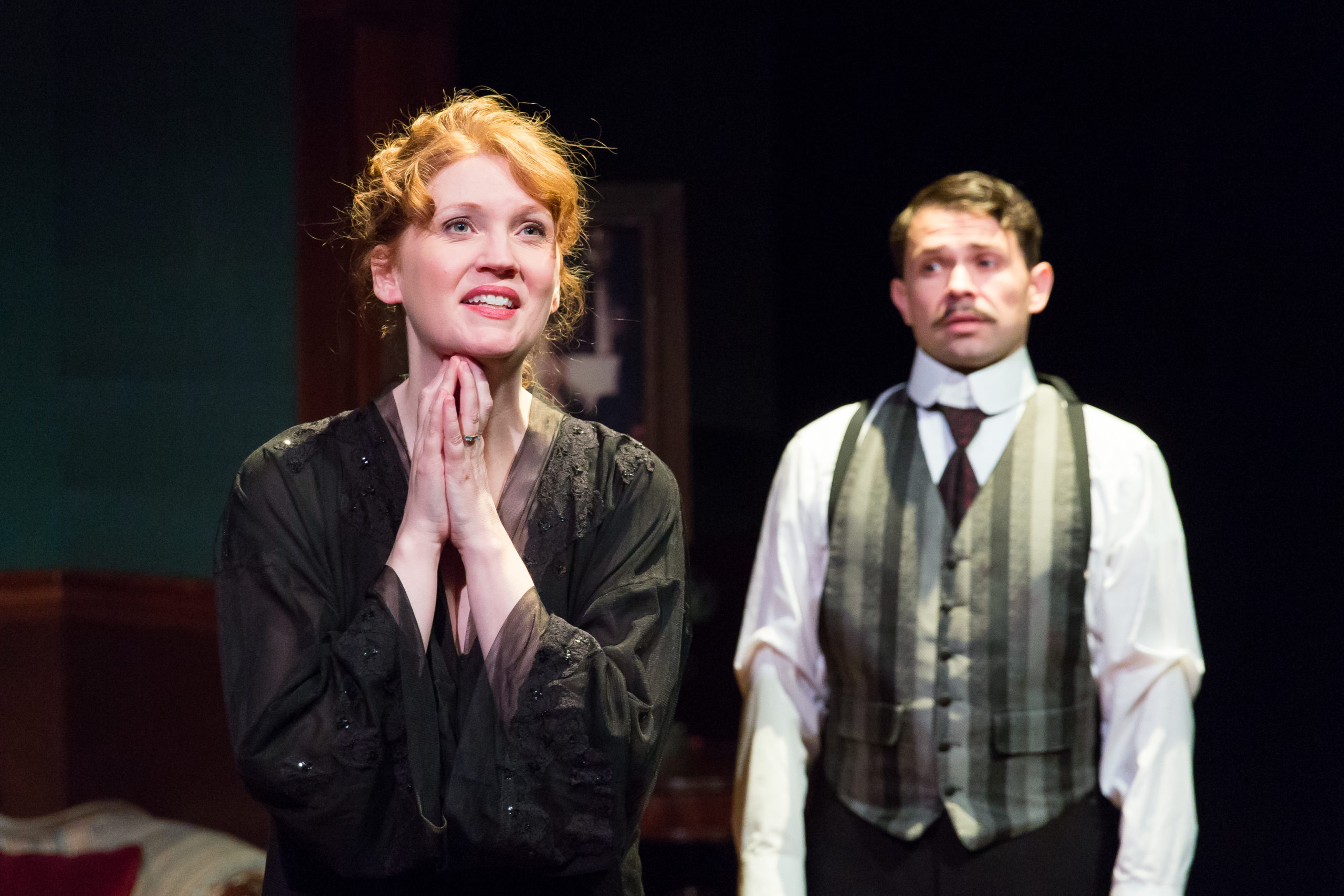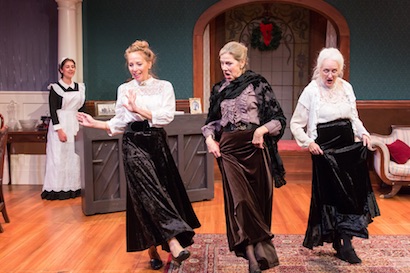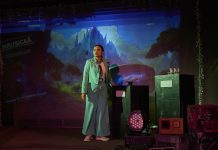Based on a renowned short story by James Joyce, The Dead, now being presented by Scena Theatre, is a slice of the lives of polite, quiet desperation lived by genteel middle-class Dubliners in the early 20th century. With a book by Richard Nelson and music by Shaun Davey (lyrics by both) and here directed by Robert McNamara, the 1999 adaptation of the Joyce story – not a “musical” in the usual sense – uses the characters’ songs to illuminate their long-standing ties and often unarticulated discontents.

The setting is the home of the now-elderly Morkan ladies, Julia (Andrea Hatfield), Kate (Rosemary Regan), and Mary Jane (Stacy Whittle). In a convincing period set (Carl Gudenis) and costumes (Alisa Mandel), a group of relatives and friends meet for a Christmas season party, as they have for 30 years.
The central character, Gabriel Conroy (Louis Lavoie), also serves as a narrator. Sensitive to the undercurrents of the gathering, touchingly uncertain of his own place in his world, able to lead yet diffident, Lavoie’s Gabriel is a thoroughly sympathetic figure. As the designated toastmaster for the evening, he gives a sweet, gracious tribute to the Morkans in his speech and song, “Three Graces.” In an unforced playwriting error, Nelson causes Gabriel to utter, midway through the play, a spoiler about the evening’s most significant emotional “reveal.”
Early in the play, Gabriel is cornered by Molly Ivors (Mo O’Rourke), a young Irish nationalist, who is irate that Gabriel writes book reviews for a pro-British newspaper. There is a fairly deeply buried subtext of erotic attraction between the two, but this, like the political disagreement they have, remains untouched as the play proceeds. Indeed, a key characteristic of the play is the extent to which important matters are left unspoken.
Gabriel’s wife Gretta (Danielle Davy) stands out as a radiant presence in the gathering, yet has her own well of sadness, beautifully expressed in “Goldenhair” and later “Michael Furey.” McNamara’s sensitive blocking of “Goldenhair” – Gabriel feels it as an opportunity to be close to his wife, while she moves separately into her own emotional space – prefigures the moment later in the show when Gabriel comes to realize that one doesn’t fully know even the people to whom one is closest.
For the older characters, the insults of age and knowledge of approaching mortality weigh heavily. Julia, a fine singer when she was young, now frail and infirm, has been booted out of her church choir. As she sings, haltingly, “When a Lovely Lady,” she brings Mary Jane to tears. Later, joined by the “ghost” of her younger self (Antonia Romm), she sings a reprise of the song, in a moment reminiscent of “One More Kiss” from Sondheim’s Follies.

The Morkan ladies lead what is probably the show’s most effective musical moment, “Naughty Girls,” in which they sing – showing an ankle or two – of the gaiety of their youth. The number, far better than anything explicitly grieving lost years, underlines the emotional tone of the play.
There is not a great deal of comedy amidst the melancholy, but Freddy Malins (John Gerald Healy), who everyone knows will arrive drunk, provides a bit in leading the lively, but unduly prolonged, “Wake the Dead.” Freddy’s degree of inebriation appears to fluctuate a good deal during the proceedings, despite a somewhat surprising paucity of alcohol at the party.
The original New York production featured an impressive cast of musical theater luminaries – Sally Ann Howes, Marni Nixon, Alice Ripley, Emily Skinner, and Daisy Eagan among them (Christopher Walken and Blair Brown were the leads). The cast bios in the program show that Scena cast actors with little musical theater experience. Whether or not purposeful, this turned out to be a distinct positive for the production. The characters are not performing for the audience. They are longtime friends, regular people, singing for one another. Their sound enhances the realism of the occasion.
Ironically, the one character who is supposed to sing beautifully, Bartell D’Arcy (Leo Delgado) – Scena’s blurb describes him as a “renowned tenor” whose singing causes Gretta to “swoon” – does not do well with the Italian aria he is given in the second half of the show.
The structure of particularly the first half of the play lends itself to static staging. One character sings, with a semicircle of the other characters behind him or her. Then another.
The succeeding dinner table and bedroom scenes, on stage right and left, respectively, place a cluster of actors in one fairly limited sector of the stage for considerable periods.
Musical director Greg Watkins skillfully accompanied the singers on keyboard, as well as providing underscoring for many of the dialogue scenes. Marianne Meadows’ lighting design relies primarily on area lighting (i.e., central playing area, dining table, bedroom) but at times was unnecessarily busy.
At the play’s conclusion, as Gabriel looks out on the snow falling throughout Ireland, he leads the company in the reflective “The Living and the Dead.” Snow ultimately covers us all. Joyce’s collection The Dubliners, which includes The Dead, was published in June 1914, two months before the guns of August ushered in their extensive and violent spasm of death. Carl Sandburg’s Grass would cover a far greater multitude, far more quickly, than Joyce’s characters could have anticipated from the gentle snows of Dublin.
Running Time: 90 minutes, with no intermission.
The Dead, presented by Scena Theatre, plays through January 12, 2020, in the black box at the Atlas Performing Arts Center, 1333 H Street NE, Washington, DC. For tickets, call the Atlas box office at 202-399-7993 or go online.
Cast: Danielle Davy, Leo Delgado, Andrea Hatfield, Buck O’Leary, Rosemary Regan, Carol McCaffrey, Maureen O’Rourke, Stacy Whittle, John Healy, Emily Collins, Daniel Riker & Antonia Romm
Raquis Petree (Choreographer & Stage Manager), Denise Rose (Sound Designer), Cate Brewer (Assistant Director), Anne Nottage (Literary Manager), and Gabriele Jakobi (Dramaturg & Resident Director)




